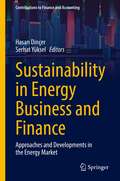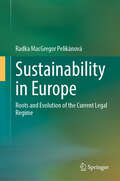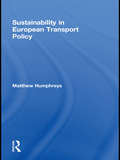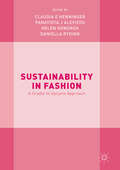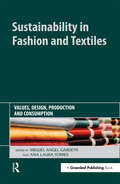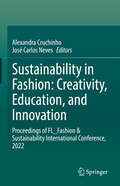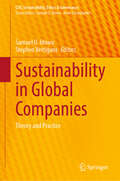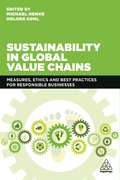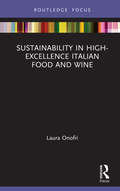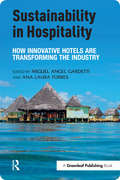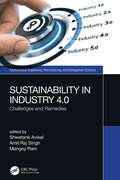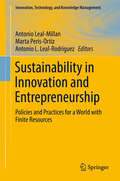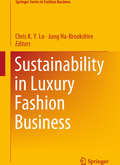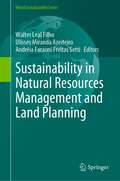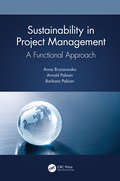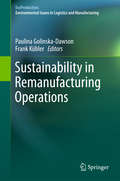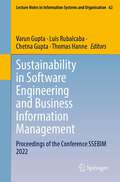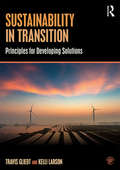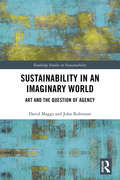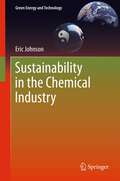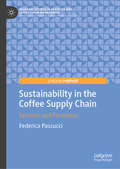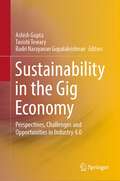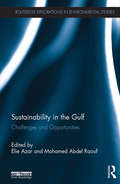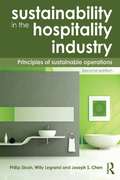- Table View
- List View
Sustainability in Energy Business and Finance: Approaches and Developments in the Energy Market (Contributions to Finance and Accounting)
by Hasan Dinçer Serhat YükselThis edited volume seeks to identify the sustainability issues currently affecting the energy business and finance. For this purpose, a broad range of perspectives on sustainability issues in the energy business and finance are taken into consideration in the context of renewable business projects. In turn, several novel strategies from the energy business and finance are illustrated with regard to sustainable organizational factors, technological infrastructure, financial facilities, economic development, and investment potential. Comparing and contrasting different sustainability perspectives can help to develop the most appropriate and successful business strategies for the sustainable energy business and finance. This book presents multidimensional analyses of sustainability issues with regard to renewable energy projects and identifies the most promising strategies, as well as efficient market conditions for the energy business.
Sustainability in Europe: Roots and Evolution of the Current Legal Regime
by Radka MacGregor PelikánováThis book analyses the roots and evolution of the concept of sustainability in Europe and the European Union. As sustainability has always mirrored certain value judgments on justice and priorities, it is suitable for functionalist, analytical, contextual and historical comparisons via multidisciplinary studies combining various branches of the social sciences, law, philosophy, and economics. The aim of this book is to explore the roots and evolution of sustainability, so as to reveal how a European style of sustainability has emerged, one that is inextricably linked to our civilization and history. It identifies linear and cyclical phases with clear trends toward expanding the reach of sustainability, its subjects and their duties. The book offers a multidisciplinary, chronological and contextual overview of the evolution of sustainability until the 21st century, while also addressing its legal regime. Sustainability has many faces and needs to be approached in a dynamic manner through the lens of sustainable development or via a multi-stakeholder model that includes private subjects and corporate social responsibility. Although primarily intended for an audience with an advanced background in law, economics and philosophy, the book will also benefit a more general audience, particularly those who want to learn where the current sustainability concerns and legal regime actually came from.
Sustainability in European Transport Policy
by Matthew HumphreysThe construction of the European Economic Communities in 1950 primarily set out to build an integrated economic zone in which national borders were, to a large extent, overcome. The ability of persons and goods to move freely within the economic zone was seminal in the realisation of economic integration. Underlying this, and therefore an implied necessity for European growth, an effective transport infrastructure was essential. However, with rising awareness of environmental issues, and a closer regard to sustainability of development, European transport systems and their regulation have come under scrutiny. This book sets out a critical analysis of the body of law and policy initiatives that constitute the EU's common transport policy. The development of the transport policy is charted through amending and founding Treaties as well as non-legislative documents. The book uses a model of sustainability as the basis for the analysis as the criteria for sustainable development were set out under Article Eleven of the Treaty on the Functioning of the European Union. However, sustainable development, when taken in the context of transport is difficult to reconcile with unbridled economic growth and unchecked freedom of movement and the book identifies a contradiction at the heart of European policy which can only become more accentuated as environmental trends become more explicit. The book argues that European regulation will eventually be forced to recognize this dichotomy, and take more forceful action to protect environmental and social development, even at the cost of economic progress. This book will be of great interest to researchers and students on European Union law and policy courses, transport studies courses and European integration courses. The book is of relevance to all those interested in environmental and transport matters.
Sustainability in Fashion
by Claudia E. Henninger Panayiota J. Alevizou Helen Goworek Daniella RydingThis book provides a critical insight into sustainability and fashion in a retailing and marketing context. Examining a truly global industry, Sustainability in Fashion offers international application with a view to contextualising important developments within the industry. Contributors use their diverse backgrounds and expertise to provide a contemporary approach in examining key theoretical concepts, constructs and developments. Topics include consumer behaviour, communications, circular economy and supply chain management. The individual chapters focus on sustainability and provide a range of fashion sector examples from high street to luxury apparel.
Sustainability in Fashion and Textiles: Values, Design, Production and Consumption
by Miguel Angel Gardetti Ana Laura TorresThere is no doubt that the textile industry – the production of clothing, fabrics, thread, fibre and related products – plays a significant part in the global economy. It also frequently operates with disregard to its environmental and social impacts. The textile industry uses large quantities of water and outputs large quantities of waste. As for social aspects, many unskilled jobs have disappeared in regions that rely heavily on these industries. Another serious and still unresolved problem is the flexibility textile industry companies claim to need. Faced with fierce international competition, they are increasingly unable to offer job security. This is without even considering the informal-sector work proliferating both in developing and developed countries. Child labour persists within this sector despite growing pressure to halt it.Fashion demands continuous consumption. In seeking to own the latest trends consumers quickly come to regard their existing garments as inferior, if not useless. "Old" items become unwanted as quickly as new ones come into demand. This tendency towards disposability results in the increased use of resources and thus the accelerated accumulation of waste. It is obvious to many that current fashion industry practices are in direct competition with sustainability objectives; yet this is frequently overlooked as a pressing concern.It is, however, becoming apparent that there are social and ecological consequences to the current operation of the fashion industry: sustainability in the sector has been gaining attention in recent years from those who believe that it should be held accountable for the pressure it places on the individual, as well as its contribution to increases in consumption and waste disposal.This book takes a wide-screen approach to the topic, covering, among other issues: sustainability and business management in textile and fashion companies; value chain management; use of materials; sustainable production processes; fashion, needs and consumption; disposal; and innovation and design.The book will be essential reading for researchers and practitioners in the global fashion business.
Sustainability in Fashion: Proceedings of FL_Fashion & Sustainability International Conference, 2022
by Alexandra Cruchinho José Carlos NevesSustainability in Fashion: Creativity, Education, and Innovation is a book that focuses on how sustainability can be integrated into the fashion and clothing industry. The set of chapters provides peer-reviewed research covering a wide range of topics, mainly focused on how sustainability can be incorporated into fashion and textile education, how consumer behaviour and marketing affect sustainability in fashion (and vice versa) and how circular economy principles can be incorporated into clothing and textile supply chains. The chapters in this proceedings volume examine sustainability not only from the perspective of academia, but also from the perspective of industry. Working across sectors in this manner can facilitate the development of real projects that can greatly contribute to sustainability in the fashion industry.
Sustainability in Global Companies: Theory and Practice (CSR, Sustainability, Ethics & Governance)
by Samuel O. Idowu Stephen VertigansThis textbook focuses on how sustainability is practiced in companies in different sectors of the global economy - examples include aviation, banking, energy, financial services, food, manufacturing, technology, transportation, and tourism. These corporate sectors are at the forefront of the debate around business and sustainability both in their usage of finite resources and their potential to deliver meaningful solutions. Consequently, several experts were brought together for this book and asked to focus on how sustainability is understood and practiced in different companies around the globe in terms of the UN Sustainable Development Goals 2030. Chapters incorporate theoretical and applied examples that can help improve levels of insight into international business approaches. They provide opportunities to learn and disseminate factors that are delivering short, medium, and long-term solutions and problems. These insights can incorporate the spectrum of activities required inorder to achieve sustainability through industrial processes, supply chains to consumer behavior. The multi-disciplinary nature of the fundamental issues also prompted a diverse selection of academics and practitioners across disciplines who have knowledge and/or experiences of sustainability and international business theories, practices, and processes. Students and academics from across related disciplines, corporations, policymakers, and members of societies who study or have an interest in sustainable development will particularly find this book useful.
Sustainability in Global Value Chains: Measures, Ethics and Best Practices for Responsible Businesses
by Michael Henke and Holger KohlSustainability can create greater efficiency and cost savings in the supply chain. Supply chains, which are more complex and global than ever before, are full of both risks and opportunities. The risks range from inconsistent or poor quality to supply disruptions to health and safety concerns to corruption. Businesses face pressure to adopt sustainable supply chain practices from various stakeholders and motivations typically come from one or more of four sources: customers, compliance, costs, competitive advantage. Sustainability in Global Value Chains is the guide to understanding all aspects and approaches of sustainable supply chains using in-depth research from leading academics from sixteen different universities.Sustainability in Global Value Chains focuses on how to make supply chains sustainable, with an emphasis on new technologies and digitization. The research featured covers topics such as KPIs in production and supply chains, the role of standards, blockchain technology and algebraic models. This comprehensive book presents real world issues, problems in implementing sustainability in the supply chain and examples of best practice.
Sustainability in High-Excellence Italian Food and Wine (Routledge Focus on Environment and Sustainability)
by Laura OnofriThis book presents contemporary case studies on selected Italian food and wine products to explore how traditional production and consumption models address and adapt to the sustainability challenges in the Italian high-excellence agri-food sector. Sustainability in High-Excellence Italian Food and Wine adopts a transaction cost economics approach, which is applied to five case-study chapters, each focusing on a key Italian agri-food product: Parmigiano Reggiano, Mozzarella di Bufala Campana, Amarone wine, Prosecco wine, and Prosciutto di San Daniele. The production and organization of these products face many challenges as they seek to balance competing priorities around economic viability, maintenance of high-quality standards and environmental and social impacts. The book argues that the development of sustainable and quality models requires changes to the structure and organization of the supply chain while also acknowledging that consumers are increasingly demanding authentic, high-excellence products that require reliable labeling systems and designations of origin mechanism. Recommending that hybrid structures, such as cooperatives and consortia, are the most cost-minimizing governance structures for the production, the book highlights that in the case of Italian excellency food, environmental sustainability and economic efficiency are not actually traded off but are reciprocally valorized through the regulation of high-quality standards. This book will be of great interest to students and scholars of food and wine excellence products, food systems and supply chains, agricultural production and economics and sustainable consumption.
Sustainability in Hospitality: How Innovative Hotels are Transforming the Industry
by Miguel Angel Gardetti Ana Laura TorresThis ground-breaking research represents the most complete collection yet on how the hospitality industry is addressing sustainability and ethical issues. Covering supply chain management, innovative sustainability initiatives, CSR programmes, biologically-respectful tourism and Value Creation, Sustainability in Hospitality: How Innovative Hotels are Transforming the Industry presents valuable global viewpoints on embedding sustainability into all aspects of the hospitality industry, and the impact this could have on transforming the sector into an advocate for more sustainable, eco-conscious tourism.The chapters in this edited collection span organizational governance, human rights and labour practices, environment and climate change, fair operating practices, stakeholder engagement, CSR and strategic management. The global reach of the collection brings case studies from China, the US, the UK, Mexico and Italy, while company case studies include Fairmont Luxury Hotels and Sextantio.Sustainability in Hospitality: How Innovative Hotels are Transforming the Industry will be an essential read for academics researching the development of ethically-conscious and sustainable hospitality, and for hotel managers and group CEOs who want to know how sustainability and CSR can be embedded in their day-to-day operations.
Sustainability in Industry 4.0: Challenges and Remedies (Mathematical Engineering, Manufacturing, and Management Sciences)
by Shwetank AvikalA large and growing number of manufacturers are realizing the substantial financial and environmental benefits of sustainable business practices. To develop more sustainable societies, industries need to better understand how to respond to environmental, economic, and social challenges and transform industrial behavior. The objective of this book is to provide the required knowledge and accelerate the transition towards a sustainable industrial system. The book will help industries to enhance operational efficiency by reducing costs and waste. It will help them increase customer response, reach new customers, and gain competitive advantage. It offers innovation, scenario planning, and strategic analysis that goes beyond compliance, as well as case studies and remedies to the industry 4.0 challenges. Professionals, as well as students, can refer to this book to add to their knowledge on Industry 4.0 and develop new ideas and solutions to the existing and future problems.
Sustainability in Innovation and Entrepreneurship
by Marta Peris-Ortiz Antonio Leal-Millan Antonio L. Leal-RodríguezThis book provides a richly illustrated study of sustainability, innovation and entrepreneurship. Specifically, it examines the ways in which governmental policies and practices modify the social conditions necessary to promote innovation in businesses and by so doing impact economic development. Exploring topics such as green innovation, green customer capital, smart cities, green entrepreneurship and environmental responsibility, this book presents some of the most current research and best practices in the field. In today's global economy, strategies, policies and practices that address the negative effects of human activity on the environment need to be incorporated into the business framework in order for companies to achieve a sustainable competitive advantage. Around the world, such changes have already resulted in a broad range of products, production methods and technical features that ensure environmental protection. At the same time, the mass media's communication of a deteriorating earth have motivated a growing number of citizens in both developed and developing nations to modify their consumption habits towards more ecological products. Consequently, an increasing number of companies are reacting to these changes in business and legal frameworks and consumer preferences by investing in new forms of green innovation or "eco-innovation" designed to promote both environmental and corporate sustainability. For example, Hewlett-Packard eliminated lead from its welding process; Wal-Mart reduced the emissions of their suppliers; and Cisco, Dell and IBM are investing in smart grids. This volume showcases pioneering efforts among companies, citizens, and government agencies that are moving from theory to practice by placing sustainability at the core of their development strategies.
Sustainability in Luxury Fashion Business (Springer Series in Fashion Business)
by Chris K. Y. Lo Jung Ha-BrookshireThis book explores new approaches and strategies that luxury fashion brands could adopt in their operations toward sustainability goals. It addresses the unique challenges faced by luxury fashion brands, given that concepts of luxury and sustainability may be conflicting. In doing so, it elaborates on how fashion brands need to manage their suppliers to comply with and improve social and environmental conditions, the pressure to fulfill the triple-bottom lines, consumer demands for transparency, and social media and its advantages in achieving sustainability goals. Exploring the notion that luxury fashion brands are in a better position to pursue superior sustainability performance, it presents research that highlights how the consequences of non-compliance could have more devastating effects on luxury brands than on mass-market brands. The book is a valuable resource for academics and practitioners in the field of business, sustainability, and fashion.
Sustainability in Natural Resources Management and Land Planning (World Sustainability Series)
by Walter Leal Filho Ulisses Miranda Azeiteiro Andréia Faraoni Freitas SettiThis book includes contributions from scientists and representatives from government and non-governmental organisations working in the field of land management and use and on management of fires. The book is truly interdisciplinary and has both a research and application-oriented dimension. The list of topics includes sustainability and water management; sustainability and biodiversity conservation; the future sustainability of nature-based industries such as agriculture, mining, tourism, fisheries and forestry; sustainability, people and livelihoods; sustainability and landscapes planning; sustainability and land use planning; handling and managing forest fires. The papers are innovative and cross-cutting, and many have practice-based experiences. Also, this book, prepared by the Inter-University Sustainable Development Research Programme (IUSDRP) and the World Sustainable Development Research and Transfer Centre (WSD-RTC), reiterates the need to promote a sustainable use of land resources today.
Sustainability in Project Management: A Functional Approach
by Anna Brzozowska Arnold Pabian Barbara PabianThis book presents a new approach to the issue of project management, showing how it can be approached through the lens of sustainability. The nature of sustainable project management is not only to achieve economic goals, but also environmental and social ones. Considering project management from the perspective of sustainability is very important because sustainable development cannot keep up with the pace and scale of accumulation of ecological and social problems. The natural potential of the Earth is quickly running low. The global equilibrium between the Earth’s ecosystems, which have developed for millions of years, and the human world of production and consumption, becomes disrupted. The focus is on a functional approach to the subject, allowing management and business to implement the methodology discussed. Topics discussed include sustainable planning, sustainable organizing, sustainable leading and sustainable controlling. The authors use their combined experience in the area to inform their novel approach. The book will be especially useful for people who are project managers, members of project teams and other project stakeholders. It may also be a useful reference for scientists and students studying the fields of management, IT and business.
Sustainability in Remanufacturing Operations
by Paulina Golinska-Dawson Frank KüblerThe present customers' consumption models result in an increasing number of used products that need to be collected and reused or disposed. Remanufacturing is a favourable scenario in order to recover the end-of-use products. It allows to capture substantial part of the resources which were used in the primary production at lower cost, providing economic, environmental and social benefits. The book presents the methods, models, case studies for improvement of sustainability in remanufacturing facilities. The focus is on small- and medium-sized enterprises and their challenges to meet resource-efficiency goal.
Sustainability in Software Engineering and Business Information Management: Proceedings of the Conference SSEBIM 2022 (Lecture Notes in Information Systems and Organisation #62)
by Thomas Hanne Varun Gupta Chetna Gupta Luis RubalcabaThe proceedings volume presents selected papers from the International Conference on Sustainability in Software Engineering & Business Information Management: Innovation & Applications (SSEBIM 2022) held in Olten, Switzerland from September 23-24, 2022. It includes research related to sustainability from both a business and technical point of view. From a business perspective, it not only addresses how to make the business operations more sustainable, but also considers factors such as human values, ethics, environment and responsibility of the businesses. From the technical perspective of software development companies, it focuses on sustainability in software engineering ranging from practices, tools, techniques and methods. The contributions reflect how software engineering teams exhibited pro-activeness in their approaches to lead to sustainable development of the software that is of highest quality and reliability.It is intended for a broad audience, including students, researchers and practitioners who work in software engineering and business information management fields.
Sustainability in Transition: Principles for Developing Solutions
by Travis Gliedt Kelli LarsonSustainability in Transition: Principles for Developing Solutions offers the first in-depth education-focused treatment of how to address sustainability in a comprehensive manner. The textbook is structured as a learning-centered approach to walk students through the process of linking sustainable behavior and decision-making to green innovation systems and triple-bottom-line economic development practices, in order to achieve sustainable change in incremental to transformational ways. All chapters combine theory and practice with the help of global case study and research study examples to illustrate barriers and best practices. Each chapter begins with learning objectives and ends with a 'check on learning' section that ties the main points back to the core themes of the book. Chapters include a section focused on measuring progress and a box comparing international research or case studies to the North American focus of the chapter. A list of additional academic sources for students that complement each chapter is included. Building sustainability tools, techniques, and competencies cumulatively with the help of problem- and project-based learning modules, Sustainability in Transition: Principles for Developing Solutions is a comprehensive resource for learning sustainability theory and doing sustainability practice. It will be essential reading for advanced undergraduate and graduate level students who have already completed introductory sustainability classes.
Sustainability in an Imaginary World: Art and the Question of Agency (Routledge Studies in Sustainability)
by John Robinson David MaggsSustainability in an Imaginary World explores the social agency of art and its connection to complex issues of sustainability. Over the past decade, interest in art’s agency has ballooned as an increasing number of fields turn to the arts with ever-expanding expectations. Yet just as art is being heralded as a magic bullet of social change, research is beginning to throw cautionary light on such enthusiasm, challenging the linear, prescriptive, instrumental expectations such transdisciplinary interactions often imply. In this, art finds itself at a treacherous crossroads, unable to turn a deaf ear to calls for help from an increasing number of ostensibly non-aesthetic fields, yet in answering such prescriptive urgencies, jeopardizing the very power for which its help was sought in the first place. This book goes in search of a way forward, proposing a theory of art aiming to preserve the integrity of arts practices within transdisciplinary mandates. This approach is then explored through a series of case studies developed in collaboration with some of Canada’s most prominent artists, including internationally renowned nature poet Don McKay; Italian composer and Head of Vancouver New Music, Giorgio Magnanesi; the renowned Electric Company Theatre, led by Kevin Kerr; and finally through a largescale multimedia installation aiming to reimagine the relationship between climate, culture, and human agency. Sustainability in an Imaginary World will be of great interest to students and scholars of arts-based research fields, sustainability studies, and environmental humanities.
Sustainability in the Chemical Industry
by Eric JohnsonIt's the new rock and roll. It's the new black. Sustainability is trendy, and not just among hipsters and pop stars. The uncool chemical sector helped pioneer it, and today, companies inside and outside the sector have embraced it. But what have they embraced? Surely not the Brundtland definition of meeting "the needs of the present without compromising the ability of future generations to meet their own needs." Sustainability describes a change in the chemical industry's approach to the external world: to regulators, to greens, to neighbors, to investors and to the general public. Displacing the adversarialism of the 1970s-80s, sustainability is a new approach to social/political conflict, and an attempt to rebuild the industry's long-suffering public image. In practice, it consists of: A 'stakeholder' approach to communications and external relations A rebranding of regulatory compliance and risk management, with the emphasis on their benefits to stakeholders Recognition (and even celebration) of the opportunities, not just the costs, of environmental and social protection The core of this book is a survey of the world's 29 largest chemical companies: how they put sustainability into action (six of the 29 do not), and the six 'sustainability brands' they have created. It begins with a history of stakeholders conflict, before looking at various definitions of sustainability - by academics, by the public and by investors. After the survey and analysis, the book covers sustainability and 'greenwash' plus the ROI of sustainability, and it gives five recommendations.
Sustainability in the Coffee Supply Chain: Tensions and Paradoxes (Palgrave Studies in Logistics and Supply Chain Management)
by Federica PascucciFrom the field to the cup, this book investigates sustainability issues along the coffee supply chain, identifying the challenges that firms face when they are called to reach sustainability goals. In particular, it explores the relationships involving the actors throughout the broad coffee supply chain, among which some tensions may emerge. Firms increasingly need to interact with various supply chain members to achieve their sustainability goals and with a variety of other stakeholders as well, such as NGOs or regulators. Therefore, in order to fully investigate sustainability, it is fundamental to adopt a broader view of the supply chain that goes beyond dyadic relationships (typically, between customer and supplier). This book adopts an “integrative logic” of sustainability and aims to explore the “hidden” or “dark side” of sustainable practices in the supply chain, for example, trade-offs, tensions and paradoxes. Overlooking these aspects can create serious impediments to a real-world progress toward sustainability. The empirical part of the book is focused on the coffee supply chain, which represents one of the most complex, globalized and inequitable supply chains, impacting communities and the environment worldwide. These characteristics make it particularly challenging for the industry to transition towards sustainability. Sustainability in the coffee sector is increasingly at risk in economic, social, and environmental terms, and there are several interdependencies among these three dimensions. The book will be of great interest to scholars and students of supply chain management, sustainability, and corporate and consumer responsibility. In addition, practitioners operating in the coffee industry could gain interesting findings about the most critical issues pertaining to sustainable practices and activities.
Sustainability in the Gig Economy: Perspectives, Challenges and Opportunities in Industry 4.0
by Ashish Gupta Badri Narayanan Gopalakrishnan Tavishi TewaryThis book provides a comprehensive and contemporary source of reference for the gig economy for sustainable businesses with a focus on Industry 4.0. It covers the theoretical and practical implications of the rise of an alternative system in the era of technology-driven business entities; and explains the emergence of the gig economy as a crucial factor in devising approaches that will help in ensuring better decision making.As the COVID-19 pandemic rages on, investors and corporations are attempting to overcome the turbulence in financial markets over the past few months. Governments and economists are scrambling to mitigate the impacts of lockdowns. Many businesses have transferred to a remote working system, and the critical challenge remains to make this form of work and business productive, efficient, and sustainable. Against this backdrop, the book provides an overview of the gig economy from varied perspective such as general business and economics; ethics, governance, and legal issues; diffusion of IT in the workplace; sustainability; future of workforce and workplaces during and post-pandemic scenarios. This edited volume also highlights several challenges and opportunities for managing the diverse workforce in the prevailing situation which has no precedence.With its discussions on the impact of the gig economy on the business world, the book carries appeal for scholars in the business, human resource professionals, industry practitioners, corporates, and policy advocates interested in learning about evolution, automation, marketing, and sustainability in the gig economy.
Sustainability in the Global City
by Gary Mcdonogh Cindy Isenhour Gary McDonogh Melissa Checker Cindy IsenhourCities play a pivotal but paradoxical role in the future of our planet. As world leaders and citizens grapple with the consequences of growth, pollution, climate change, and waste, urban sustainability has become a ubiquitous catchphrase and a beacon of hope. Yet, we know little about how the concept is implemented in daily life - particularly with regard to questions of social justice and equity. This volume provides a unique and vital contribution to ongoing conversations about urban sustainability by looking beyond the promises, propaganda, and policies associated with the concept in order to explore both its mythic meanings and the practical implications in a variety of everyday contexts. The authors present ethnographic studies from cities in eleven countries and six continents. Each chapter highlights the universalized assumptions underlying interpretations of sustainability while elucidating the diverse and contradictory ways in which people understand, incorporate, advocate for, and reject sustainability in the course of their daily lives.
Sustainability in the Gulf: Challenges and Opportunities (Routledge Explorations in Environmental Studies)
by Elie Azar Mohamed Abdel RaoufSustainability is a topic of great interest today, particularly for the Gulf Cooperation Council (GCC) countries, which have witnessed very rapid economic and demographic growth over the past decade. The observed growth has led to unsustainable consumption patterns of vital resources such as water, energy, and food, highlighting the need for an urgent shift towards green growth and sustainable development strategies. Sustainability in the Gulf covers the region’s contemporary development challenges through the lens of the UN’s Sustainable Development Goals (SDGs), which place sustainability at the centre of the solution to the current environmental, economic, and social imbalances facing GCC countries. The book presents multiple analyses of Gulf-specific sustainability topics, examining the current status, challenges, and opportunities, as well as identifying key lessons learned. Innovative and practical policy recommendations are provided, as well as new conceptual angles to the evolving academic debates on the post-oil era in the Gulf. Through chapters covering sector-related studies, as well as the socio-economic dimensions of the sustainability paradigm, this volume offers valuable insights into current research efforts made by the GCC states, proposing a way forward based on lessons learned. This is a valuable resource for students, academics, and researchers in the areas of Environmental Studies, Political Economy, and Economics of the GCC states.
Sustainability in the Hospitality Industry 2nd Ed: Principles of Sustainable Operations
by Philip Sloan Joseph S. Chen Willy LegrandSustainability is one of the single most important global issues facing the world. A clear understanding of the issues surrounding climate change, global warming, air and water pollution, ozone depletion, deforestation, the loss of biodiversity and global poverty is essential for every future manager in the hospitality industry. Present and future hospitality executives need to know how sustainable management systems can be integrated into their businesses while maintaining and hopefully improving the bottom line. Sustainability in the Hospitality Industry, second edition, is the only book available to introduce the students to economic, environmental and social sustainable issues specifically facing the industry as well as exploring ideas, solutions, and strategies of how to manage operations in a sustainable way. Since the first edition of this book there have been many important developments in this field and this second edition has been updated in the following ways: updated content to reflect recent issues and trends including hotel energy solutions and green hotel design two new chapters on 'Sustainable Food' and 'Social Entrepreneurship and Social Value' updated international case studies throughout to explore key issues and show real life operational responses to sustainability within the hospitality industry. New case studies on growth hotel development markets, Asia and the Middle East new practical exercises throughout to apply your knowledge to real-life sustainability scenarios. This accessible and comprehensive account of Sustainability in the Hospitality Industry is essential reading for all students and future managers.
